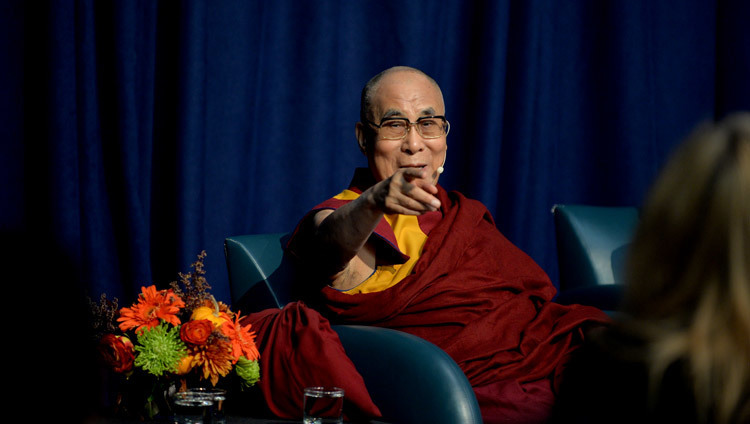Дэлхий дахинд болж байгаа хүчирхийллийн хамгийн том эх сурвалж нь дайн дажин ба цэргийн хүчирхэг байгууламжууд гэдэг нь мэдээжийн асуудал юм. Хамгаалах уу, довтлох уу гэсэн зорилгын алийг нь ч агуулсан бай, эдгээр хүчирхэг байгууллагууд гагцхүү хүмүүсийг алж хөнөөхийн тулд оршин тогтнодог. Дайны мөн чанарын талаар анхааралтай бодох шаардлага зүй ёсоор гарч байна. Бидний ихэнх нь цэргийн ажиллагааг сонирхолтой бөгөөд сэтгэл татам, эр хүний хувьд авьяас чадвар болон эр зоригоо харуулах боломж гэж үзэж дадсан байдаг. Цэрэг арми хууль ёсны байгаа учраас дайныг байх л ёстой зүйл гэж бид үздэг. Нийлэнхүйдээ хэн ч дайныг гэмт хэрэг гэж үздэггүй, хэн ч дайныг гэмт шинж чанараар нь хүлээж авдаггүй. Үнэндээ бидний тархи угаагдсан байна. Дайн бол сэтгэл татам ч биш, сонирхолтой ч биш. Дайн бол харгис хэрцгий. Түүний үнэн мөн чанар нь уй гашуу ба зовлон мөн.

Дайн бол хүмүүсийн дунд гарсан гал түймэр гэсэн үг бөгөөд түүний шатахуун нь амьд хүмүүс гэж хэлж болно. Энэ зүйрлэлийг би хамгийн оновчтой бөгөөд ойлгомжтой нь гэж боддог. Орчин үеийн дайнд үндсэндээ янз бүрийн галт зэвсгийг хэрэглэж байна, гэтэл бид түүнийг сэтгэл татам гэж үзэж дассан бөгөөд энэхүү гайхалтай зэвсэг нь техник, технологийн онцгой үр дүн хэмээн ярихдаа хэрвээ түүнийг амьдрал дээр хэрэглэвэл тэр нь амьд хүмүүсийг шатаах болно гэдгийг огтхон ч дурсдаггүй билээ. Мөн дайн бол тархан түгэж байгаа байдлаараа гал түймрийг ямагт санагдуулдаг. (Дайны талбарт) аль нэг хэсгийн хүч сулрах үед командлагч нь нэмэлт хүч илгээнэ. Ингэснээрээ амьд хүмүүсийг гал руу түлхэж байгаа хэрэг юм. Энэ талаар бидний тархийг угаасан учраас бид цэрэг нэг бүрийн зовлон шаналлын талаар боддоггүй. Ямар ч цэрэг шархдах, эсвэл үхэхийг хүсэхгүй. Түүний ойр дотныхон нь ч түүнд ямар нэг гай зовлон учраасай гэж хүсэхгүй. Аль нэг цэрэг үхэх, эсвэл насан туршдаа зэрэмдэг болоход түүний хамаатан садан, найз нөхдөөс эхлээд дор хаяж тав, эсвэл арван хүн түүнтэй адил зовж шаналах болно. Бид хэтэрхий төөрөгдөлд орсноосоо болж энэхүү гамшиг зовлон даамжирч байгаад балмагдахгүй байна.
Үнэнээ хэлэхэд би ч гэсэн хүүхэд байхдаа цэрэг армид татагдаж байсан. Тэдний хувцас нь гоё чамин бөгөөд дэгжин харагддаг байсан. Уруу татах явдал ингэж эхэлдэг. Нэг л өдөр асуудалд оруулах тийм тоглоомоор хүүхдүүд тоглож эхэлдэг. Хүн хөнөөхөөс өөр агуулгатай өчнөөн сонирхолтой тоглоом, цэргийнхээс өөр өчнөөн сайхан хувцас байгаа. Дахин хэлэхэд, томчууд бид хэрвээ дайнд ингэтлээ ховсдуулаагүй байсан бол хүүхдүүддээ дайны холбогдолтой тоглоомонд дасахыг зөвшөөрснөөрөө тэднийгээ золгүй зүйл рүү түлхэж байгаагаа тодхон харж чадах байсан. Цэрэг байсан зарим хүн надад ярихдаа эхний хүнээ буудахад үнэхээр эвгүй сэтгэгдэл төрж байсан боловч үргэлжлүүлэн хөнөөхөд тэр нь хэвийн зүйл мэт санагддаг гэж байсан. Цаг хугацааны явцад бид юунд ч дасч чаддаг шүү дээ.
Цэргийн байгууламж нь зөвхөн дайны үед л сүйтгэгч чанартай байдаг юм биш ээ. Анхнаасаа төлөвлөлт, зохион байгуулалтаасаа эхлээд л хүний эрхийг дээд зэргээр зөрчихөөр хийгддэг бөгөөд эн тэргүүнд цэргүүд нь дарамт дэглэлтээс болж байнгын шаналлыг амсдаг. Анх офицер армийн ач холбогдол, түүний сахилга бат болон дайсныг ялан дийлэх шаардлагын талаар сайхан үг хэлсний дараа л үй олон цэргийн хүний эрх замхран алга болно. Дараа нь тэд өөрийн хувийн хүслээ мартах, эцэст нь амиа золиослох шаардлагатай болно. Түүнээс ч илүүтэйгээр хэрвээ арми хүчтэй болбол өөрийн орны сайн сайхныг ч устгах эрсдэл буй.
Аливаа нийгэмд сүйтгэх хүсэл эрмэлзэлтэй хүмүүс байдаг бөгөөд өөрсдийн хүсэл зорилгыг биелүүлэх хүчин чадалтай байгууллагыг захирахыг санаархахдаа тэд яахаас ч буцахгүй байдаг. Гэхдээ өнөөдөр өөрийн ард түмнийг дарангуйлж, олон улсын хэмжээнд асуудал үүсгээд байгаа олон харгис дарангуйлагч нар хичнээн түрэмгий, эсвэл хорон муу санаатай байсан ч хэрвээ тэдэнд цэргийн байгууламж байгаагүй бол, түүнийг нь нийгмээс хүлээн зөвшөөрч зөвтгөөгүй бол тэд бусдад гай тарьж, тоо томшгүй олон хүний аминд хүрч чадахгүй байсан нь тодорхой. Арми хүчирхэг байгаа газар дарангуйллын аюул мөнхөд буй. Дарангуйлал нь жигшүүрт, сүйтгэгч шинж чанартай засаглалын хэлбэр мөн гэдгийг хэрвээ бид үнэхээр ойлгодог юм бол үүний үндсэн шалтгаануудын нэг нь цэргийн хүчирхэг байгууламж гэдгийг хүлээн зөвшөөрөх ёстой.
Милитаризм буюу цэрэг зэвсгээр хөөцөлдөх нь туйлын өртөг үнэтэй асуудал мөн. Цэргийн хүчийг нэмэгдүүлэх замаар энх тайванд хүрэх нь нийгэмд үлэмж их ачааллыг үүрүүлнэ. Засгийн газрууд асар их хөрөнгийг илүү ээдрээ төвөгтэй зэвсэгт зарцуулж байгаа боловч үнэндээ хэн ч түүнийг хэрэглэхийг хүсдэггүй. Айдас хүйдэс бий болгох зүйлд зөвхөн мөнгө бус, хүний үнэ цэнэтэй эрч хүч болон мэдлэг ухаан үр ашиггүй зарцуулагдаж байна.
Хэдийгээр би дайныг хатуу эсэргүүцдэг ч, бууж өгөхийг дэмждэггүй гэдгээ тодорхой хэлэхийг хүсч байна. Шударга бус түрэмгийллийг эсэргүүцэхийн тулд ихэнхдээ (байр сууриндаа) хатуу зогсох шаардлагатай байдаг. Жишээ нь, Дэлхийн хоёрдугаар дайныг ерөнхийд нь зөвтгөсөн гэдэг нь бид бүгдэд ил. Винстон Черчилль дүгнэн хэлсэнчлэн, хоёрдугаар дайн нацистын Германы дарангуйллаас “соёл иргэншлийг“ аварсан. Миний бодлоор бол Солонгосын дайн бас л шударга байсан, учир нь дайн Өмнөд Солонгост ардчиллыг аажмаар хөгжүүлэх боломж өгсөн. Гэхдээ бид аливаа зөрчилдөөнийг ёс суртахууны хувьд зөвтгөх үү, үгүй юу гэдгээ өнгөрсөн хойно нь л шүүн тунгаах боломжтой. Жишээ нь, хүйтэн дайны үед цөмийн сүрдүүлэг тодорхой хэмжээгээр үр дүн өгч байсан гэдгийг бид одоо харж байна. Гэхдээ иймэрхүү асуудлыг ямар нэг тодорхой шалгуураар үнэлэх туйлын бэрхшээлтэй байдаг. Дайн бол угаасаа хүчирхийлэл, хүчирхийлэл бол урьдаас тааж мэдэшгүй зүйл. Тиймээс хэрвээ боломжтой бол түүнээс зайлсхийх нь дээр бөгөөд тухайн дайн үр өгөөжтэй , эсвэл үгүй гэдгийг бид урьдаас хэзээ ч таамаглах аргагүй.
Жишээ нь, хүйтэн дайны тухайд сүрдүүлгийн хүчээр тогтвортой байдлыг бий болгож чадаж байсан ч, жинхэнэ энх тайвныг тогтоож чадаагүй. Сүүлийн дөчин жил Европ дайн үзээгүй, гэхдээ энэ нь бодит энх тайван биш, харин өнгөц төрх төдий байдал юм. Ямар ч байсан зэвсэг үйлдвэрлэж энх тайвныг тогтоох нь гагцхүү түр зуурын арга хэмжээ мөн. Сөргөлдөгч талууд харилцан итгэлцээгүй цагт аль нэг тохиолдлын үйл явц хүчний тэнцвэрийг алдагдуулж чадна. Зөвхөн жинхэнэ итгэлцлийн суурин дээр л бат бэх энх тайван баталгаажна.












